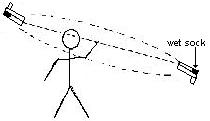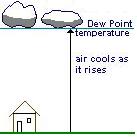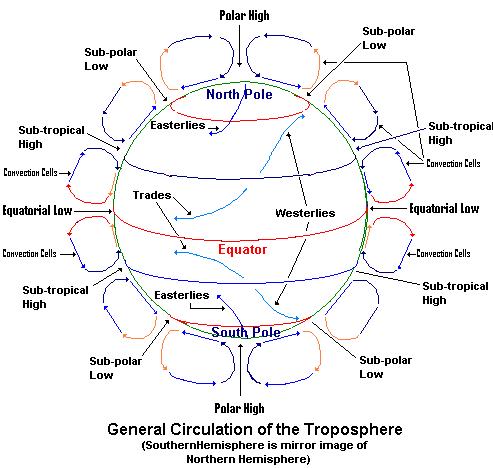
|
| SCIENCE | MATTER | SOLAR SYSTEM | PLANETS | ATMOSPHERE | WIND and TEMPERATURE | HUMIDITY | WEATHERING | SOIL | SEASONS | MASS WASTING | SEASONS and CLIMATE | WIND WORK | STREAMS | LAND FORMS | GROUND WATER | CAVES/KARST | THE OCEAN | TIDES & ESTUARIES | WAVES | GLACIERS | GLACIAL LANDFORMS | VOLCANOES | VOLCANOES | CHON | PLATE TECHTONICS | EARTHQUAKES | ROCKS | CLIMATE CHANGE |
The Atmosphere is the gas around a body in space.
Air is breathable atmosphere. On Earth it consists of:
Life here is supported by the atmosphere, solar energy, and our planet's magnetic fields. The atmosphere absorbs the energy
from the Sun, recycles water and other chemicals, and works with the electrical and magnetic forces to provide a moderate
climate. The atmosphere also protects us from high energy radiation and the frigid vacuum of space.
The envelope of gas surrounding the Earth changes from the ground up. Four distinct layers have been identified using thermal characteristics (temperature changes), chemical composition, movement, and density. Temperature = average kinetic energy of atoms/molecules.
Atmospheric Layers:

Humidity - amount of moisture (water) in the air.
Relative humidity - amout of water in the air divided by the amount of water the air can hold.
amount of moisture in air________
amount of moisture that air can hold
This can be determined by use of a "sling", two thermometers fixed togather, with a damp "sock" on the end of one. The user swings the "sling" around several times then measures the difference in temperatures and then looks up the relative humidity on the chart.

The lower the humidity, the faster the rate of evaporation.
The amount of water air can hold is dependent on temperature of the
air. Warmer air holds more moisture.
At the saturation point the air can hold no more water.
Dew Point - temperature at saturation.
Air cools as it rises until it reaches the Dew Point.

Clouds (drops of water) form when air is cooler than Dew Point.
If many of the drops get togather, they gain weight and fall as rain, sleet, hail, snow.
Mammals spends energy to keep warm i.e. exercising to keep warm when its cold.
Sweat cools a mammals body by evaporating. If the humidity is high the body feels sticky/damp, if it is low it feels dry. The lower the humidity, the more comfortable a person is.
Climate is the average weather of a local area.
The BIG 10 pointer!
